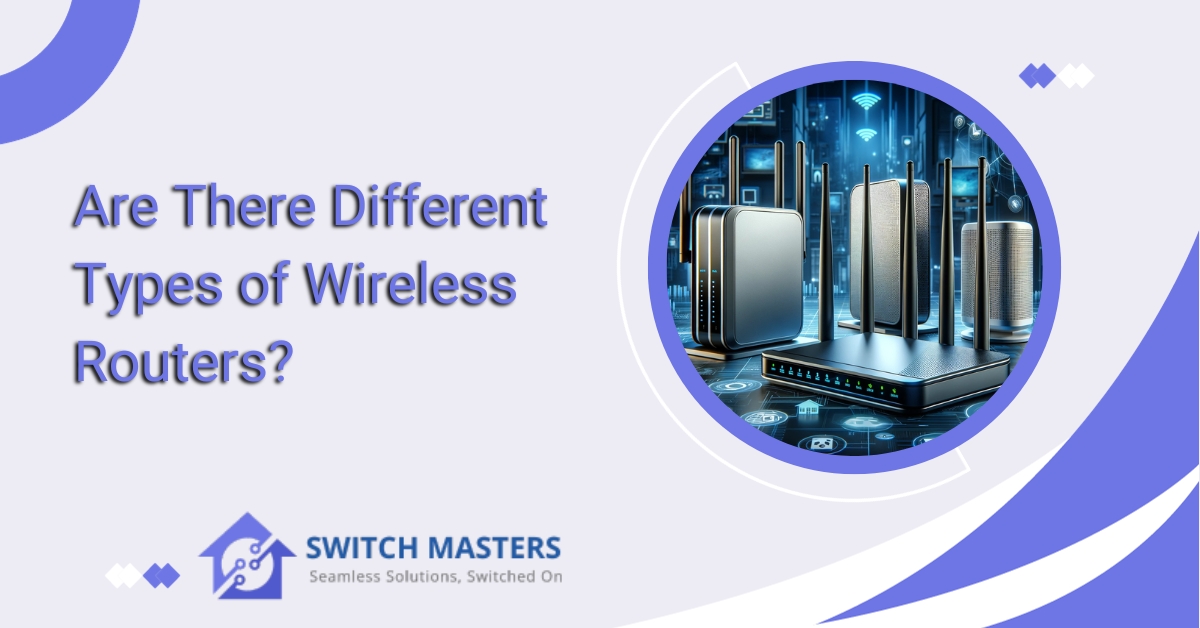Explore the diverse world of Are There Different Types of Wireless Routers? Our comprehensive guide delves into the features, specifications, and use cases of different wireless routers to help you find the perfect fit for your home or office network. Learn about dual-band, tri-band, mesh systems, and more to enhance your internet experience.
Introduction
Staying connected to the Internet is more important than ever in today’s technologically advanced world. A wireless router is an integral part of our home and office networks. However, are there different types of wireless routers? The answer is a resounding yes. There are several types of wireless routers, each designed to address a specific networking environment and needs. There is a wide range of routers available, ranging from basic single-band routers ideal for small spaces to advanced tri-band and mesh systems offering extensive coverage and high-speed connectivity.
In this discussion, we will discuss the diverse types of wireless routers available, their unique features, and how they cater to different internet usage requirements. Understanding the differences between these routers will help you make an informed decision for an uninterrupted online experience, whether you are a casual surfer, a gaming enthusiast, or require a robust network for your home office.
Table of Contents
Are There Different Types of Wireless Routers?
In the digital era, a robust and reliable internet connection is fundamental to our daily activities, whether it is for work, entertainment, or staying connected with loved ones. An important component of this connectivity is an unnoticed device – a wireless router – which is often overlooked, but plays a crucial role. The question often asked is, “Are there different types of wireless routers?” The answer is not simply a simple yes, but a revelation of a variety of options tailored to meet different needs and environments.
1. Single-Band Routers: The Basics
In general, a single-band router is one of the most basic types of wireless router. In addition to operating on the 2.4 GHz frequency band, these routers are typically the most affordable option. They are well suited for basic web browsing, email, and social media use, particularly in smaller homes or apartments. However, their limitation lies in their susceptibility to interference from other household devices such as microwaves and cordless phones, as well as offering slower speeds than more advanced routers.
2. Dual-Band Routers: A Step Up
Dual-band routers operate at two frequencies, as their name implies, 2.4 GHz and 5 GHz. Due to this dual functionality, there is less interference and a more stable connection. As the 5 GHz band is faster and less congested, these routers are ideal for activities such as streaming HD videos and playing online games. They are suitable for medium-sized homes and users who are connected to a moderate amount of devices.
3. Tri-Band Routers: For the Heavy Users
A tri-band router is a router with an additional 5 GHz band. This type of router is particularly beneficial in households with multiple devices, as it can handle multiple connections simultaneously without any problems. They are ideal for large homes, heavy streaming, gaming, and users of smart home devices that require a constant, stable connection.
4. Mesh Routers: Seamless Connectivity Throughout
A mesh router is the latest innovation in wireless networking. Mesh systems are not like traditional routers in that they serve as a single point of connection; instead, multiple router-like devices are placed around the home to create a network ‘mesh’. This ensures seamless connectivity with no dead zones, making them ideal for large homes and multi-story buildings. They are user-friendly, easy to set up, and manage through smartphone apps.
5. Choosing the Right Router
It is important to note that the selection of the right wireless router depends on factors such as the size of your home, the number of devices you plan to connect to, and your online activities. For smaller spaces and fewer devices, a single or dual-band router may suffice. However, larger homes with high internet usage would benefit from tri-band or mesh routers.
Routers with Advanced Security Features
A wireless router is more than merely a device that provides access to the Internet in an age where digital security is paramount. We need to discuss routers that have advanced security features as they are the first line of defense against cyber threats. These routers do more than connect devices, they safeguard your digital life.

1. The Importance of Router Security
A growing number of connected devices, such as smartphones and smart home appliances, increases the potential for cyber attacks. You must choose a router with robust security features since an unsecured router can be a gateway for hackers to access your personal information, engage in identity theft, or even hijack your device.
2. Key Security Features in Advanced Routers
- Firewall: It is important to know that a powerful router has a firewall that controls incoming and outgoing network traffic according to an applied rule set. This prevents unauthorized access to your network.
- WPA3 Encryption: A new Wi-Fi Protected Access protocol, WPA3, provides cutting-edge encryption, which enhances the security of data transmitted over your network, protecting you from eavesdroppers and brute-force attacks.
- Automatic Updates: The ability for routers to automatically update their firmware ensures that they are always equipped with the latest security patches and features, thus reducing vulnerabilities.
- Guest Network Access: Using an advanced router, you can set up a separate guest network with limited access, keeping your primary network secure when guests need Wi-Fi access.
- Parental Controls: As a result of these features, you are able to restrict access to certain websites and manage children’s online time, ensuring a safer online environment.
- VPN Support: The use of routers that support Virtual Private Networks (VPNs) provides an additional level of security, especially when accessing your network remotely.
3. The Future of Router Security
To combat emerging threats, router manufacturers are continuously developing new security features to combat the increasing prevalence of Internet of Things (IoT) devices. In addition to offering real-time alerts regarding suspicious activity, some routers are now equipped with built-in antivirus solutions, intrusion detection systems, and advanced monitoring tools.
4. Choosing a Secure Router
In choosing a router, it is necessary to consider not only the speed and range but also the security features offered. Research and compare different models, search for reviews and updates on security features and choose a reliable brand with a reputation for putting security first.
Smart Routers and IoT Integration
It has become increasingly important for routers to provide more than basic internet connectivity in an era when the Internet of Things (IoT) is rapidly expanding. Increasingly, smart routers are serving as central hubs for IoT integration, streamlining the connection and management of a variety of smart devices throughout the home and business. This article discusses how smart routers are revolutionizing IoT integration and the benefits they provide.
1. The Rising Tide of IoT and Smart Routers
In response to the proliferation of Internet of Things devices, such as smart thermostats and security cameras, more intelligent and efficient networking solutions are required. In order to meet this demand, smart routers offer advanced features that enable and enhance the performance of these devices, making them essential for a fully integrated smart office or home.
2. Features of Smart Routers for IoT Integration
- Enhanced Connectivity: For IoT devices that depend on continuous internet access to function properly, smart routers provide stronger and more reliable Wi-Fi signals, ensuring seamless connectivity.
- Improved Security: In light of the increase in IoT devices, security concerns have escalated. Smart routers are equipped with advanced security protocols to protect your network against potential cyber threats, ensuring your personal information is safe.
- Network Management: The routers allow users to monitor and control device activity, control access, and even prioritize bandwidth for critical devices through intuitive interfaces.
- Compatibility with IoT Standards: A smart router is typically designed to be compatible with a number of IoT communication protocols, including Zigbee or Z-Wave, allowing a wider range of smart devices to be seamlessly integrated.
3. The Role of AI and Machine Learning
With smart routers, you can optimize network performance using artificial intelligence (AI) and machine learning by adapting to your usage patterns, automatically adjusting settings for optimal performance, and gaining insights into your network’s health.
4. The Convenience of Voice Control
Another feature of many smart routers is integration with voice assistants, such as Amazon Alexa or Google Assistant. This capability allows users to manage their network and connected devices using voice commands, enhancing the convenience of smart homes.
5. Choosing a Smart Router for IoT
Consider the number and type of IoT devices in your home, the router’s compatibility with different protocols, and the security features it offers. It is also necessary to consider the router’s capability to support future expansions of IoT devices.
FAQ’s
How many wireless routers are there?
Two WiFi routers can be utilized in the same household. By implementing a second router, your internet signal can be enhanced both in range and in strength, effectively addressing common home WiFi issues such as dead zones and intermittent connectivity. It is important to note, however, that employing two routers may cause signal interference, which could adversely affect the overall performance of the network.
What are the three 3 categories of routers?
An individual’s router connects multiple devices to the internet, acting as a gateway to the internet. Enterprise routers, on the other hand, are designed to manage more extensive network systems often found in businesses. A core router is responsible for directing high-speed data traffic within the main internet infrastructure, while a wireless router is responsible for providing Wi-Fi connectivity to devices, allowing them to communicate wirelessly. Finally, edge routers act as a bridge between smaller, local networks and larger, broader networks.
Can I have 2 routers on one network?
Multiple routers can be used within the same network. It is, however, imperative to take careful consideration in implementing this configuration. Below, you will find instructions on how to utilize several routers effectively, as well as the advantages that can be expected from such a configuration.
How fast are wireless routers?
The speed capabilities of wireless routers are measured in megabits per second (Mbps). The first consumer Wi-Fi models were capable of 11 Mbps. Later, the midrange 802.11g routers provided 54 Mbps speeds, and in the following decade, 802.11n routers emerged, offering speeds ranging from 150 Mbps to 600 Mbps. The more advanced 802.11ac routers are available today, offering speeds exceeding 1 Gbps.
How do wireless routers work?
Each radio band represents a distinct lane allowing data to travel on separate routes to prevent overcrowding within your router. Wi-Fi is transferred through your router using radio bands, which function like unseen pathways. Because some devices require more bandwidth than others, the effectiveness of your router depends on the number of bands it possesses – whether it is single, dual, or tri-band.
Conclusion
There is indeed a wide variety of wireless routers available on the market, suited to different needs and environments. There is a router to meet the needs of every situation, from simple single-band routers for basic internet use to advanced multi-band, tri-band, and mesh routers designed for heavier usage and larger spaces. Having an understanding of these differences is imperative to selecting the right router for your home or office, which will ensure you get the best possible performance and connectivity.















